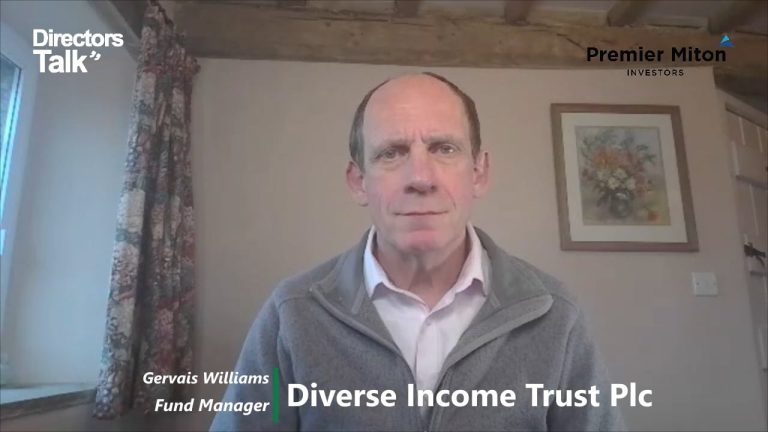Diverse Income Trust plc (LON:DIVI) has presented the half-yearly financial report of the company for the period to 30 November 2020.
NAV total return to shareholders of 11.7%, 4.8% ahead of the return on the UK market This includes the increase in NAV, plus the dividends paid during the half year and compares with an increase in the FTSE All-Share Index of 6.9% on a total return basis over the six months to 30 November 2020. The share price total return was 11.0% as the discount was slightly wider at the end of November 2020 than the end of May 2020.
Dividends maintained The first and second interim dividends in respect of the period have been held at the same level as the previous year despite a moderate fall of 11.1% in portfolio income. The Board expects at least to maintain the full year dividend, if necessary by using revenue reserves to support dividend growth until portfolio income recovers fully.
Retained revenue reserves brought forward represent retained earnings from previous years of more buoyant portfolio dividends The investment trust structure enables the Company to use such reserves to support distributions in years when incoming portfolio revenue is less buoyant. As already stated in the 2020 Annual Report, the Group used part of its retained revenue reserves to support dividend growth in that year. Revenue earnings of 1.77p per share for this interim period fully covered the two dividends in respect of the period, which were 1.75p per share in total, so there was no further requirement to make use of brought-forward revenue reserves during the period. The Board expects at least to maintain the full year dividend. Although there is a possibility that at the year-end there may be a shortfall in portfolio revenue due to the pandemic, the Board is prepared to use the revenue reserves to support dividend growth until portfolio income recovers fully.
Summary of Results
| 30 November 2020 | 30 November 2019 | 31 May 2020 | |
| NAV per ordinary share | 97.10p | 95.23p | 88.82p |
| Ordinary share price (mid) | 91.00p | 91.60p | 84.00p |
| Discount to NAV1 | 6.3% | 3.8% | 5.4% |
| Revenue return per ordinary share | 1.77p | 1.99p | 3.27p |
| Ongoing charges1 | 1.07%2 | 1.11% | 1.09% |
| Ordinary shares in issue | 358,045,105 | 378,289,047 | 378,289,047 |
1 Alternative performance measure. Details provided in the Glossary below.
2 Estimated as at 30 November 2020. Ongoing charges are the Company’s annualised revenue and capitalised expenses (excluding finance costs and certain non-recurring items) expressed as a percentage of the average monthly net assets of the Company during the year.
CHAIRMAN’S STATEMENT
This report covers the six-month period between 31 May and 30 November 2020, a period when many stock markets staged a recovery after a sharp sell-off earlier in the year at the start of the global pandemic.
Total returns over the half year
Although pandemic control continued to be problematic over the period under review, the news of successful vaccine trials led to a major rally in stock markets towards the end of the half year. The Trust’s NAV total return of 11.7% over the six-month period, compares with the 6.9% total return of the FTSE All-Share Index including dividend income. The share price total return was 11.0%. Improving recovery hopes following the vaccine news spurred a rebound in some of the consumer-linked and other cyclical share prices, which helped the FTSE SmallCap Index (excluding Investment Companies) to deliver a total return of 24.6% over the half year, while that of the FTSE AIM All-Share Index was 20.5%. Both were well ahead of the wider UK market’s returns, after a period of being shunned by investors leery of UK economic exposure.
Revenue returns over the half year
The NAV total return quoted above includes both the capital appreciation of the Trust’s portfolio, and the revenue per share from the portfolio which funds the Trust’s four dividends to shareholders each year. Towards the end of the Trust’s previous year to May 2020, corporate profitability fell steeply due to the pandemic, with many UK-quoted companies having subsequently cut their dividends to investors. The Trust’s revenue per share over this half-year period was 1.77p, compared with the 1.99p revenue per share last year. This was a resilient outcome during a period when many other trusts’ revenues were down by much larger percentages. Both the first and the second interim dividends to shareholders, of 0.85p and 0.90p respectively this year, are the same as last year’s. The Board has stated that it expects the Trust’s four dividends for the current year at least to match last year’s total of (3.70p), although this may involve drawing upon past revenue reserves if the Trust’s revenue for the current year is insufficient.
Total return since the Trust was first listed in April 2011
Between 28 April 2011, the date the Trust was first listed, and the end of November 2020, the NAV total return of the Trust was 174.2%, nearly three times the total return on the FTSE All-Share Index over the same period, at 58.9%. Over the same period, the total return on the FTSE 250 index was 108.6%, that on the FTSE SmallCap Index (excluding Investment Trusts) was 122.4% and the FTSE AIM All-Share Index total return was 27.4%. So, the Company, which invests across the market capitalisation spectrum, has beaten the returns on all the principal component indices in the market.
Share redemptions
Over the half year under review, the Trust’s share price and NAV total returns grew at similar rates. With the ongoing investor anxiety during the initial pandemic lockdown period, exacerbated by concerns about Brexit, there was an imbalance of daily buyers and sellers over the half year, and the Trust’ share price had traded at an average discount of 7.3%. This is wider than the Board would expect in normal times and the Board has shareholder authority to buy back shares when the discount is anomalously wide. Clearly these were not normal times and as sentiment stabilised during the summer, the discount narrowed from over 12% in June 2020 to under 7% at the end of November 2020.
In order to help to moderate discount volatility, the Trust offers shareholders the option to redeem all their shares each year. The next redemption point for shareholders will be at the end of May 2021, for those who submit requests during April 2021.
Board succession
This is my first report to you as your Chairman. Please feel free to get in touch with me if you have suggestions, questions or concerns about the Company. Shareholders have every reason to be grateful to Michael Wrobel, my predecessor as Chairman. He and his Board presided over a highly successful first phase of the Company’s life, from its launch in April 2011 until the AGM in October 2020– a truly eventful period which our Manager has navigated with considerable skill. Calum Thomson took over as Senior Independent Director following the AGM.
Prospects
The Trust’s investment universe covers a wider range of industry sectors than others, including well-established mainstream stocks and younger businesses listed on the AIM exchange. The broader opportunity set offers the choice of a greater number of individual successful companies with superior dividend prospects, suitable for inclusion in the Trust’s portfolio. These factors have been reflected in the Trust’s differentiated investment exposure and its outperformance of the comparative stock market indices since April 2011. A second advantage of the more diversified sources of income is the relative resilience of portfolio revenue compared with the highly concentrated income on offer in the FTSE 100 index (where many dividends believed to be reliable were cut in 2020). The Company is also attentive to opportunities for portfolio risk to be scaled back, where warranted, or for gearing to be used with the objective of enhancing returns.
Concerns about the economic risks of Brexit and the associated political uncertainty have complicated the investment story for the UK market, which has performed poorly since 2015. Part of this may be structural, owing to the weightings in mature or low-growth sectors, while part may offer an opportunity to invest in attractive companies whose individual prospects are being dismissed owing to investors’ concerns about the market as a whole. This landscape is, of course, what our Manager’s experienced stock-picking team is employed to navigate on behalf of shareholders. With economic recovery evidently at the top of the political agenda, interest rates at record lows and the “B” word looking date-expired as an excuse for ignoring UK domestic stocks, the prospects for an active stock picking approach in the somewhat neglected UK equity market appear above average.
Finally, 2020 was a year when humanity as the globe’s dominant species was humbled by one of its smallest. It was also a year when scientific minds were able to devise multiple effective vaccines for the coronavirus in less than a tenth of the usual time. This cannot erase the human, often irreversible, effects of the COVID-19 pandemic but it helps to reinforce an optimistic view of mankind’s ability to overcome setbacks and create a better future for succeeding generations. Investment success in the stock market is ultimately rooted in finding companies that do things useful to others better than their competitors do. In a changing world, that is a key driver of active investment management. Another factor is that cash speaks truth. Finding companies that sustainably generate surplus cash is at the heart of what the team at Premier Miton is seeking do, in order to deliver a growing income and on its back, growing shareholder total returns.
Andrew Bell
Chairman – Diverse Income Trust
17 February 2021
MANAGER’S REPORT
Who are the fund managers of the Trust?
The Company is managed by Premier Portfolio Managers Limited, a wholly-owned subsidiary of Premier Miton Group plc. Premier Miton Group plc is an independent, listed fund management company, formed from the merger of Premier Asset Management and Miton Group in November 2019. The group has a well-established reputation for successfully managing UK-quoted smaller company portfolios over the longer term. Miton Group was appointed as Manager when the Trust listed in April 2011.
The day-to-day management of the Trust’s portfolio continues to be carried out by Gervais Williams and Martin Turner, who came together at the time of the Trust’s launch. Martin and Gervais have had a close working relationship since 2004, with complementary expertise that led them to back a series of successful companies.
Gervais Williams
Gervais joined Miton in March 2011 and is Head of Equities in Premier Miton. He has been an equity fund manager since 1985, including 17 years at Gartmore. He was named Fund Manager of the Year by What Investment? in 2014. Gervais is also a board member of the Quoted Companies Alliance and a member of the AIM Advisory Council.
Martin Turner
Martin joined Miton in May 2011. Martin qualified as a Chartered Accountant with Arthur Andersen and had senior roles and extensive experience at Merrill Lynch and Collins Stewart.
In the half year to November 2020, the Trust’s revenues fell slightly and yet its dividends to shareholders were maintained. How sustainable are the Company’s dividends?
For many years, as the cost of borrowing progressively fell, asset valuations simultaneously rose to the extent that many quoted companies were confident enough to scale back their margins of safety. The global pandemic however, led the boards of many to worry that their past assumptions may have been too risky and numerous quoted companies passed their dividends in the period from March to May 2020 – just prior to the start of the half year under review.
Over the half-year period to November 2020, some of the Trust’s portfolio holdings, such as Amino, had not resumed dividend payments, and oil majors such as BP and Royal Dutch Shell had greatly reduced theirs compared with last year. Interestingly, some portfolio holdings have already found that they were overly cautious in the March to May 2020 period, so have subsequently resumed dividend payments after only a short break. Direct Line and Admiral car insurance companies, for example, have not only resumed their previous dividend policies, but also paid additional dividends during this period to make up for those passed in the period between March and May 2020. Others, like CMC Markets, have thrived during the volatile stock market conditions, and considerably increased the dividends they have paid to investors.
Prior to the current period, when the FTSE 100 suffered its major setback in March 2020, the Trust’s holding in a FTSE 100 Put option was sold, bringing in £20m of additional portfolio capital. As this cash has been invested, it has brought in additional dividend revenue for the Trust.
In aggregate, the Trust’s revenue per share has fallen back very modestly over this half-year period as compared with the half year to November 2019. Although some of the Trust’s portfolio holdings may not recover as fast as investors hope, we believe that the prospective revenue per share for the current year to May 2021 will rise ahead of that for the year to May 2020. With this in mind, the Board has stated that it intends at least to maintain the annual dividend this year, as it did last year, even if this involves drawing upon past reserves.
What were the main contributors to the Trust’s outperformance over the half year?
The half year between the end of May and the end of November 2020 was a period when stock markets around the world rallied as good vaccine news more than offset ongoing worries about COVID-19 hotspots. During the half year, the share prices of CMC Markets, AO World and 888 Holdings all appreciated substantially as their businesses continued to thrive through the global recession. Between them, they enhanced the Trust’s return over the half year by over 4.0%.
In contrast, the share prices of Manolete, Centamin and Avacta fell back and collectively detracted just over 1.8% from the Trust’s return in the period. It should be highlighted that the share prices of all three had substantially outperformed just prior to the period under review, and their share price reversals reflected a pull back on previous gains. The elevated valuations of these holdings at the outset did lead to them being trimmed back during the period.
What are the main factors driving the Trust’s outperformance since it first listed in April 2011?
In the UK, an analysis of stock market data since 1955 reveals that the best performing stocks have been those outside the mainstream indices, with the very highest returns from those stocks that also stood on low, overlooked valuations. Whilst stocks with these characteristics have not outperformed continuously, their strong returns have been a persistent trend through a variety of economic and stock market conditions. When they succeed, their share prices tend to rise by much greater percentages than is usual for mainstream stocks. This factor has been evident in the premium return that the Trust’s portfolio has delivered during the six-month period to the end of November 2020.
There are periods when abundant market liquidity boosts investor enthusiasm for higher-profile smallcaps. A good example was the group of dot.com stocks which outperformed over the millennium, but subsequently fell back when market liquidity normalised.
Over recent years, there has been plentiful stock market liquidity and high-profile technology stocks have outperformed by a very substantial margin. Furthermore, the UK’s decision to leave the EU in June 2016 introduced years of uncertainty about the details of Brexit, which has since held back interest in the UK stock market. As both of these factors recede, we anticipate that investor interest in UK stocks will normalise once more.
Despite the two major headwinds outlined above, the Trust’s strategy has still delivered a NAV total return of 174.2% between issue in April 2011 and November 2020. This return equates to a total return of 11.1% per annum which is amongst the best of its peer group. We believe the potential for the strategy through a full stock market cycle – including long periods when regular, overlooked quoted companies outperform – could prove to be an even more differentiating factor in future than it has been in the past.
How unusual is the deep, multi cap investment universe of the UK stock market?
Prior to a sustained period of globalisation over recent decades, the returns on mainstream stock markets were often not very much ahead of the underlying rate of inflation. At that time, institutional investors were obliged to allocate a portion of their capital to quoted small and microcaps to deliver sufficiently commercial returns. During the period of globalisation, the mainstream stock market indices have delivered such strong returns, over such a long period, that institutional interest in small and microcap stocks has faded. Over the last three decades, this lack of institutional interest has resulted in the closure of many of the small and microcap bourses around the world.
Fortunately, an exchange for quoted small and microcap companies has remained viable, because the UK government has offered dedicated tax exemptions on the grounds that these companies generate more skilled employment and productivity improvements than mainstream ones. Furthermore, when quoted smallcaps succeed, they also tend to boost tax revenues.
The current very elevated valuations of government bonds imply that prospective returns on mainstream assets could be much more modest in future. If this becomes a consensus view, it would lead to renewed institutional interest in quoted small and microcaps, as easier asset returns become scarce.
Going forward, the prospects for the UK economy may not be very different from other countries, but we believe that the prospects for the UK stock market could be very different. The UK stock market is distinctive in that over half of the companies listed there have a market capitalisation of less than £150m. The UK’s wide-ranging, vibrant universe of quoted small and microcaps is a marked point of difference which might become relevant if global growth were to prove more patchy in the future.
What are the prospects for the Trust?
During the pandemic-induced recession, both central banks and governments have greatly scaled up their policies of financial stimulus, which has led to stock market valuations around the world actually increasing faster than corporate earnings have declined. As long as inflationary pressures remain benign, we anticipate that these current policies will remain in place.
As successful vaccines are rolled out in 2021, some market commentators anticipate that consumer spending may catch up much more quickly than previously thought. To some degree the valuation of US government bonds appears to reflect inflationary apprehensions. Were the inflationary outlook to become less benign, then the valuations of many high-volatility market favourites could fall back significantly.
A change such as this would be favourable for the UK stock market, given that it has few mega caps with very elevated valuations, and greater weightings in recovery stocks such as financial and energy companies. Specifically, the valuation of many UK-quoted companies has fallen behind that of comparatives around the world so we believe its recovery prospects are strong – always assuming that the implementation of the Brexit agreement with the EU is not chaotic.
In practice, the potential for premium return is often more pronounced further down the market capitalisation scale, because small caps tend to be more overlooked than those in the mainstream indices. Finally, should a number of private businesses fail after such a deep recession, quoted companies with strong balance sheets may find they can enhance their growth prospects by expanding into vacant markets, as well as making low cost acquisitions from the receiver. Companies with a listing have access to external capital, giving them the scope both to repay debts and to fund any additional working capital that may be required in the acquired businesses, whilst retaining key skilled employees.
Overall, we are increasingly confident about the prospects of the Trust over both the short and longer term.
Gervais Williams and Martin Turner
17 February 2021
PORTFOLIO INFORMATION
as at 30 November 2020
Rank | Company | Sector & main activity | Valuation £’000 | % of net assets | Yield1 % |
| 1 | CMC Markets | Financials | 12,562 | 3.6 | 5.5 |
| 2 | Admiral | Financials | 6,919 | 2.0 | 3.9 |
| 3 | Randall & Quilter2 | Financials | 6,375 | 1.8 | 4.2 |
| 4 | K3 Capital2 | Financials | 6,178 | 1.8 | 3.4 |
| 5 | AO World | Consumer Services | 6,157 | 1.8 | – |
| 6 | Kenmare Resources | Basic Materials | 6,129 | 1.8 | 2.1 |
| 7 | Strix2 | Industrials | 5,979 | 1.7 | 3.3 |
| 8 | IG | Financials | 5,841 | 1.7 | 5.4 |
| 9 | 888 Holdings | Consumer Services | 5,628 | 1.6 | 2.5 |
| 10 | Diversified Gas & Oil2 | Oil & Gas | 5,618 | 1.6 | 10.1 |
| Top 10 investments | 67,386 | 19.4 | |||
| 11 | Legal & General | Financials | 5,355 | 1.5 | 7.0 |
| 12 | Morrison (WM) Supermarkets | Consumer Services | 5,293 | 1.5 | 3.8 |
| 13 | Direct Line Insurance | Financials | 5,041 | 1.4 | 2.5 |
| 14 | Phoenix | Financials | 4,927 | 1.4 | 6.5 |
| 15 | Sabre Insurance | Financials | 4,659 | 1.3 | 6.8 |
| 16 | Plus500 | Financials | 4,595 | 1.3 | 6.4 |
| 17 | Centamin | Basic Materials | 4,489 | 1.3 | 7.9 |
| 18 | FRP Advisory2 | Industrials | 4,407 | 1.3 | 0.7 |
| 19 | Rio Tinto | Basic Materials | 4,384 | 1.3 | 6.2 |
| 20 | Tesco | Consumer Services | 4,343 | 1.3 | 4.3 |
| Top 20 investments | 114,879 | 33.0 | |||
| 21 | Intermediate Capital | Financials | 4,301 | 1.3 | 3.2 |
| 22 | Touchstone Exploration | Oil & Gas | 4,300 | 1.3 | – |
| 23 | National Grid | Utilities | 4,299 | 1.3 | 5.5 |
| 24 | Mondi | Basic Materials | 4,216 | 1.2 | 2.4 |
| 25 | Smurfit Kappa | Industrials | 4,167 | 1.2 | 3.1 |
| 26 | Sainsbury (J) | Consumer Services | 4,160 | 1.2 | 1.5 |
| 27 | iEnergizer2 | Industrials | 4,151 | 1.2 | 5.2 |
| 28 | HSBC | Financials | 4,075 | 1.1 | – |
| 29 | Drax | Utilities | 3,928 | 1.1 | 5.0 |
| 30 | M&G | Financials | 3,882 | 1.1 | 9.6 |
| Top 30 investments | 156,358 | 45.0 | |||
| 31 | Concurrent Technologies2 | Technology | 3,863 | 1.1 | 3.0 |
| 32 | DWF | Industrials | 3,856 | 1.1 | 2.3 |
| 33 | Polymetal International | Basic Materials | 3,847 | 1.1 | 3.9 |
| 34 | Amino Technologies2 | Technology | 3,839 | 1.1 | – |
| 35 | Pan African Resources2 | Basic Materials | 3,824 | 1.1 | 3.5 |
| 36 | BHP | Basic Materials | 3,724 | 1.1 | 5.4 |
| 37 | Paypoint | Industrials | 3,699 | 1.1 | 12.3 |
| 38 | Aviva | Financials | 3,681 | 1.1 | 4.1 |
| 39 | Gamesys | Consumer Services | 3,676 | 1.0 | – |
| 40 | Vodafone | Telecommunications | 3,596 | 1.0 | 6.6 |
| Top 40 investments | 193,963 | 55.8 | |||
| Balance held in 88 equity investments | 139,821 | 40.2 | |||
| Total equity investments | 333,784 | 96.0 | |||
| 600 Group 8% Convertible Loan Notes 14/02/20223 | 2,055 | 0.6 | |||
| Intercede Group 8% Secured Convertible Loan Notes 29/12/20214 | 1,802 | 0.5 | |||
| Active Energy 8% Loan Notes 14/03/20224 | 873 | 0.3 | |||
| Fixed interest investments | 4,730 | 1.4 | |||
| Total investments | 338,514 | 97.4 | |||
| Other net current assets | 9,152 | 2.6 | |||
| Net assets | 347,666 | 100.0 |
1 Source: Thomson Reuters. Based on historical yields and therefore not representative of future yields. Includes special dividends where known.
2 AIM/NEX listed.
3 Bermuda Stock Exchange listed.
4 TISE listed.
PORTFOLIO INFORMATION – continued
as at 30 November 2020
| Portfolio exposure by sector (%) – £338.5 million | |
| Financials | 35.3 |
| Industrials | 12.8 |
| Basic Materials | 12.8 |
| Consumer Services | 11.9 |
| Oil & Gas | 9.3 |
| Consumer Goods | 4.9 |
| Technology | 4.0 |
| Utilities | 3.1 |
| Health Care | 2.9 |
| Telecomms | 1.6 |
| Cash and Fixed Interest | 1.4 |
| 100.0 |
| Actual income by sector (%) – £7.4 million | |
| Financials | 47.7 |
| Basic Materials | 10.7 |
| Oil & Gas | 9.1 |
| Industrials | 8.7 |
| Consumer Services | 8.6 |
| Utilities | 5.1 |
| Cash and Fixed Interest | 3.1 |
| Consumer Goods | 2.5 |
| Telecomms | 2.3 |
| Health Care | 1.4 |
| Technology | 0.8 |
| 100.0 |
| Portfolio by asset allocation (%) – £338.5 million | |
| AIM/NEX Exchanges | 29.8 |
| FTSE 100 Index | 26.3 |
| FTSE 250 Index | 20.6 |
| FTSE SmallCap Index | 9.2 |
| Other | 9.1 |
| International Equities | 2.3 |
| Cash and Fixed Interest | 1.4 |
| FTSE Fledgling Index | 1.3 |
| 100.0 |
| Portfolio by spread of investment income (%) – £7.4 million | |
| FTSE 250 Index | 33.7 |
| FTSE 100 Index | 30.6 |
| AIM/NEX Exchanges | 16.9 |
| Other | 6.3 |
| FTSE SmallCap Index | 4.6 |
| Cash and Fixed Interest | 3.1 |
| International Equities | 3.0 |
| FTSE Fledgling Index | 1.8 |
| 100.0 |
Source: Thomson Reuters.
The LSE assigns all UK-quoted companies to an industrial sector and frequently to a stock market index. The LSE also assigns industrial sectors to many international quoted equities and those that have not been classified by the LSE, have been assigned as though they had. The portfolio as at 30 November 2020 is set out in some detail above, in line with that included in the Balance Sheet. The income from investments above comprises all of the income from the portfolio as included in the Income Statement for the six-month period. The AIM and NEX market are both UK exchanges specifically set up to meet the requirements of smaller listed companies.
The first two tables above determine the overall sector weightings of the Company’s capital at the end of the half year and with regard to the income received by the Company over the six-month period. The second pair of tables determines the LSE stock market index within which portfolio companies sit and the indices that derive the income received by the Company over the half year.
Investments for the Company’s portfolio are principally selected on their individual merits. As the portfolio evolves, the Manager continuously reviews the portfolio’s overall sector and index balance to ensure that it remains in line with the underlying conviction of the Manager. The Investment Policy is set out below, and details regarding risk diversification and other policies are set out each year in the Annual Report.
INTERIM MANAGEMENT REPORT AND DIRECTORS’ RESPONSIBILITY STATEMENT
Interim Management Report
The important events that have occurred during the period under review, the key factors influencing the financial statements and the principal risks and uncertainties for the remaining six months of the financial year are set out in the Chairman’s Statement and the Manager’s Report above.
The principal risks facing the Group are substantially unchanged since the date of the Annual Report and Accounts for the year ended 31 May 2020 and continue to be as set out in that report on pages 18 to 21.
Risks faced by the Group include, but are not limited to, investment and strategy, smaller companies, sectoral diversification, dividends, share price volatility and liquidity/marketability risk, gearing, key man risk, engagement of third party service providers, market risk and credit and counterparty risk.
Responsibility Statement
The Directors confirm that to the best of their knowledge:
- the condensed set of financial statements has been prepared in accordance with International Accounting Standard (“IAS”) 34, Interim Financial Reporting, as adopted by the European Union; and gives a true and fair view of the assets, liabilities and financial position of the Group; and
- this Half-Yearly Financial Report includes a fair review of the information required by:
- DTR 4.2.7R of the Disclosure Guidance and Transparency Rules, being an indication of important events that have occurred during the first six months of the financial year and their impact on the condensed set of financial statements; and a description of the principal risks and uncertainties for the remaining six months of the year; and
- DTR 4.2.8R of the Disclosure Guidance and Transparency Rules, being related party transactions that have taken place in the first six months of the current financial year and that have materially affected the financial position or performance of the Group during that period; and any changes in the related party transactions that could do so.
This Half-Yearly Financial Report was approved by the Board of Directors on 17 February 2021 and the above responsibility statement was signed on its behalf by:
Andrew Bell
Chairman – Diverse Income Trust
17 February 2021











































